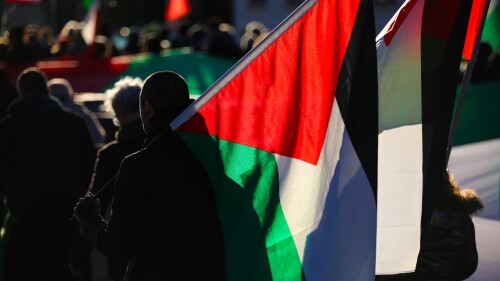The recent reports revealing that the United States offered Iran an interim nuclear agreement show that the White House is still pursuing its JCPOA agenda. The proposal, which Iran turned down, would have frozen nuclear enrichment at the 60 percent level while providing some cash flow and sanctions relief for Iran. Most importantly, this episode shows that the White House has no alternative plans as Iran continues its advance toward nuclear breakout.
Earlier this week, Israeli journalists revealed that the White House has discussed with European and Israeli officials the possibility of an interim agreement with Iran. According to the reports, the Biden administration held indirect negotiations with the Iranians back in January. It offered the Iranians to unfreeze some of its bank accounts and provide some sanctions relief in exchange for freezing current nuclear enrichment at the 60 percent level.
The willingness of the White House to offer such a proposal, despite the continuation of Iranian support for Russia in the war in Ukraine and after the human rights crisis over women’s rights in Iran, shows that the United States is deeply worried about the current advancement in the nuclear program. Last January, IAEA reports revealed that inspectors discovered particles of 83 percent enriched uranium at the Fordow facility. An Iranian drone also just killed an American contractor and injured others in Syria, to which the U.S. responded with multiple airstrikes.
A few weeks ago, U.S. officials asked the UK not to label the IRGC a terrorist organization in order not to affect the odds for a new deal.
This proposal shows the creeping normalcy of Iranian nuclear activity, reaching the point of establishing 60 percent enrichment as a new baseline. This means that Iran gained leverage over the U.S. and pushed the White House to lower its expectations significantly. Although the reports did not signify what sanctions were to be lifted and for how long, it still does not seem like a sound idea to provide Iran with cash and relief merely for a temporary freeze at the 60 percent level. Not to mention this does not change the fact that Iran has accumulated nearly 90 kilos of highly enriched uranium.
If anything, this proposal signals Washington’s desperation and lack of willingness to explore alternatives to paying Teheran off and letting its IRGC off the hook. A few weeks ago, U.S. officials asked the UK not to label the IRGC a terrorist organization in order not to affect the odds for a new deal. This is despite the continuous attempts by the IRGC to assassinate former U.S. officials and abduct Iranian activists residing in the West.
While turning down the U.S. offer, Iran accepted China’s when it came to mediating a possible reconciliation with Saudi Arabia. After signing the diplomatic agreement in Beijing last month, Iran’s top diplomat is meeting with his Saudi counterpart this Thursday in Beijing likely to sign more agreements paving the way for an Arab-Iranian dialogue. This meeting was announced the same day Israel revealed it shot down an Iranian drone that infiltrated Israeli airspace and suspected Hezbollah of planning attacks in Northern Israel.
According to sources in Saudi Arabia, the kingdom today is acting on the assumption that Washington has no vision or strategy for the Middle East.
This escalation in Iranian activity against Israel, while moving towards the de-escalation of hostilities with Arabs under the sponsorship of China, might be the beginning of new regional dynamics at a time of waning U.S. influence in the region and an internal Israeli political crisis. The fact that the U.S. seems to be either unwilling or unable to provide any alternatives to stop the Iranian nuclear program means that an Israeli airstrike against Iran is getting more likely by the day.
The Middle East is currently in a state of flux. According to sources in Saudi Arabia, the kingdom today is acting on the assumption that Washington has no vision or strategy for the Middle East. It is fair to assume that others, including Iran, are too. The Arab Gulf powers ideally seek a de-escalation of tensions with Iran so they may proceed with their ambitious economic projects to transform their societies and guarantee their economic superiority for more decades to come. China has similar goals to protect its energy investments in the Arab Gulf and to supplant the U.S. as the dominant power in the region.
Whether the Arab and the Chinese calculations will lead them to press both Israel and Iran to avoid a regional confrontation is still an open-ended question. Still, it’s fair to say that if Arabs and Iran can find a workable formula, then Israel is on its own.








